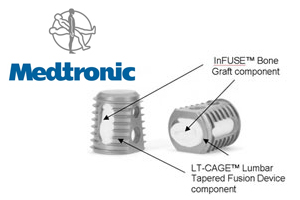
A California appeals court this week reanimated a product liability lawsuit filed over Medtronic‘s (NYSE:MDT) controversial InFuse bone-growth protein, reversing a lower court’s decision that federal regulations in this case preempt state rules.
The preemption doctrine is based on a U.S. Supreme Court ruling that state laws that differ from or add to federal regulations are trumped by the federal rules. The high court included a caveat, however: in some cases, claims citing state laws that exactly parallel the federal rules are allowed. The California Court of Appeal took that caveat into account in its January 27 decision, partially overturning a lower state court ruling that plaintiff John Coleman’s claims were preempted.
Coleman was implanted with the InFuse product in April 2009 in a posterior fusion operation, according to court documents. InFuse is approved only for anterior fusion procedures. Coleman allegedly suffered from numbness and pain after the surgery; CT scans revealed that the bone-morphogenetic material in the InFuse implant had spurred bone growth that "encased the nerves in Coleman’s spine," according to the documents.
Coleman’s lawsuit was initially dismissed when the lower court agreed with Medtronic’s preemption argument. Coleman’s appeal relied in part a U.S. Court of Appeals for the 9th Circuit decision that parallel state claims are not preempted by federal rules. Coleman argued that Medtronic is liable for failing to warn about adverse events associated with InFuse and for promoting its off-label use.
The appeals court agreed with enough of the argument to keep Coleman’s suit alive, ruling that federal laws covering how medical device companies must report adverse events are parallel with California’s liability laws on failure to warn, according to the documents.
"California law imposes a parallel requirement under the common law strict liability tort of failure to warn. The device manufacturer can be found liable if it ‘did not adequately warn of a particular risk that was known or knowable in light of the generally recognized and prevailing best scientific and medical knowledge available at the time of manufacture and distribution,’" the state appeals court ruled.
The appeals court used the same reasoning in its decision that 2 of Coleman’s claims for negligence, 1 based on failure to warn of adverse events and the 2nd on off-label promotion, are similarly not preempted. But the court disagreed with another of Coleman’s claims, failure to warn on the grounds of off-label promotion.
"In our view, Coleman’s failure to warn claim cannot include a theory of off-label promotion because he would inherently be claiming that by promoting the off-label use of Infuse, Medtronic incurred a duty to warn plaintiff and his doctors about the risks of such use. Because Medtronic has already complied with federal requirements for warnings and labeling, any state law requirement to provide additional warnings would be different from, and in addition to, federal requirements," according to the documents. "Federal regulations prevent device manufacturers from promoting off-label use of FDA-approved devices. Those requirements are substantively different than the requirements imposed by California common law in the failure to warn context."
The court demurred on a 3rd claim for manufacturing defect, ruling that it was too early in the proceedings for a proper ruling on whether the state law parallels federal law.
The California appeals bench sent the Coleman case back to the Los Angeles County Superior Court for reconsideration of the 3 claims it upheld, awarding costs on appeal to the plaintiff.
"The judgment is reversed to the extent the trial court sustained the demurrer to the 3rd amended complaint without leave to amend as to the causes of action for (1) strict liability failure to warn based on a failure to warn the FDA theory, (2) negligence, and (3) design defect. We remand the case for further proceedings. Costs on appeal are awarded to Coleman," according to the documents.

